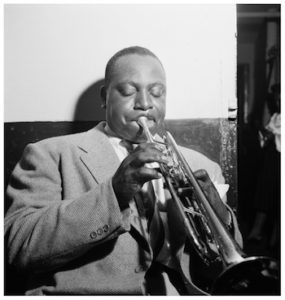
Cootie Williams
On this date, we mark the birth of Cootie Williams in 1908. He was a Black trumpeter whose mastery of mutes and expressive effects made him one of the most distinctive jazz musicians.
Charles Melvin Williams was born in Mobile, Alabama. A self-taught trumpeter, Williams toured with several bands, including Lester Young's family band, in his mid-teens before moving to New York in 1928. The next year, he replaced the influential Bubber Miley in the plunger-muted trumpet role in Duke Ellington's band, which was fundamental to its sound. Influenced by Louis Armstrong, Williams was more modern and stylish than Miley, with a wider range of techniques. Williams soon expanded his mutes' ranges of timbres and expression and became a master of open-horn playing.
His emotional range, from intimate to extrovert to harsh, was uncommonly wide, his sense of harmony was sophisticated, and he was a valuable improviser and interpreter among the hundreds of Ellington recordings on which he is featured--the "Miniature Concertos," "Echoes of Harlem," and "Concerto for Cootie." He also led a small ensemble of fellow Ellington band members, Cootie Williams and His Rug Cutters.
Williams left Ellington in 1940 and spent a year in Benny Goodman's band. In the face of the general decline of the big band business, he led a rhythm-and-blues group. He rejoined Ellington in 1962, and after Duke's death, he played in the Mercer Ellington band into the 1970s.
Especially notable among his recordings is the 1957 album "The Big Challenge," led by Williams and Rex Stewart. Cootie Williams died on September 15th, 1985, in New York City.
All That Jazz: The Illustrated Story of Jazz Music
General Editor: Ronald Atkins
Copyright 1996, Carlton Books Limited
ISBN 0-76519-953-X